Arts & Entertainment
Tamar Braxton posts, then recants, homophobic rant
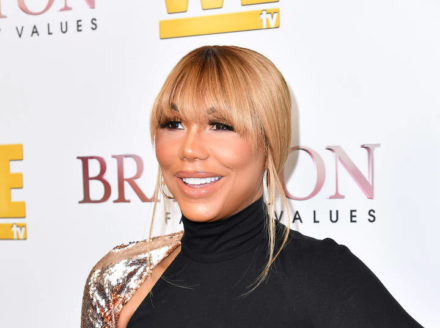
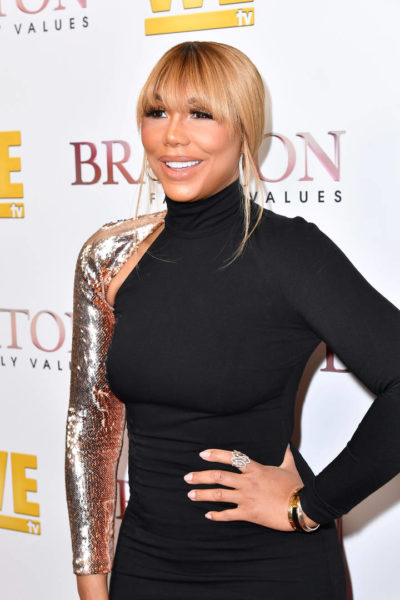
Tamar Braxton (Photo credit: Earl Gibson III/Getty Images)
Singer Tamar Braxton incurred the wrath of gay Twitter on Saturday with a homophobic social media rant that has members of the community questioning her authenticity as an LGBTQ ally.
The 42-year-old singer, who is younger sister to pop music icon Toni Braxton, posted what she called a “public service announcement” on her Instagram page, insisting that if a woman’s boyfriend “don’t touch” them in more than three or four days, then it’s an obvious sign they’re gay.
“Truth is ladies that these dudes out here really do be gay!” Braxton decreed in the post. “It ain’t enough money, beauty, hair, babies in the world to keep them!! They want D**K!! Periodt!!”
She went on to reassure her followers, “It’s nothing wrong with you, but they will find EVERY reason in the world to make u not good enough!!!,” before warning them, “If he lays with you for 3, 4, 10 days and he don’t touch u, it’s NOT YOU!! HE WANT A MAN!! And that’s on my momma.”
The singer is known for performing dance songs at multiple Pride events. She has also been a guest judge on “RuPaul‘s Drag Race.”
Braxton has since deleted the Instagram post, but not before screen captures had already hit social media.
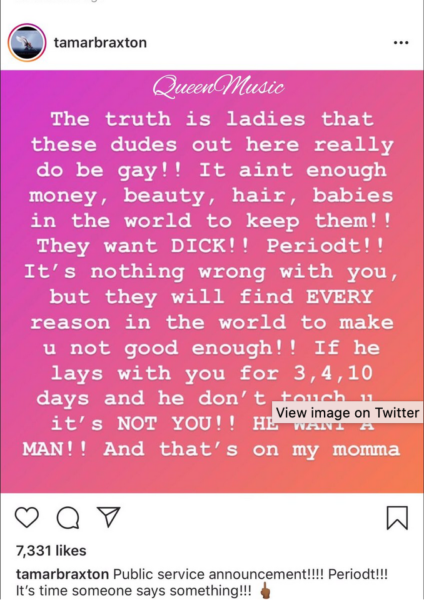
Image capture via Instagram
Response to the post was swift and merciless, with scathing comments from Twitter users like @iamkingdash, who tweeted that “Tamar Braxton is the example of a ‘fag hag’ who benefits off of gay culture but secretly despises the community,” and @Gmcgruder, who chimed in with “I seriously wish #TamarBraxton would just sing and not talk…..”
In an effort to calm the waters, Braxton took to Twitter herself on Monday to apologize, as well as to address speculation that her tone-deaf outburst had been prompted by a presumed breakup with boyfriend David Adefeso.
In her tweet, the singer wrote that her “public service announcement” had nothing to do with Adefeso. “saying, Y’all know I’m going live….If you are in ya bag, ya shouldn’t be. I shouldn’t have been in My feelings, &ranted on social media based off a conversation with my friends. I was talking about me but not me and David. I’ve been through a lot. This is why i stay on my fake page.”
On Instagram, she also on Monday posted a video of Adefso with a comment saying, “Tamar x @david.adefeso X beans [heart emoji] together forever….you have the best way with words. Thank you my love.”
Events
Los Angeles Blade to take special part in NLGJA Los Angeles inaugural journalism awards
Three inaugural journalism awards will honor those who championed LGBTQ+ stories in 2024, including the Troy Masters Legacy Award for Visionaries in Media, in honor and memory of our founding publisher.
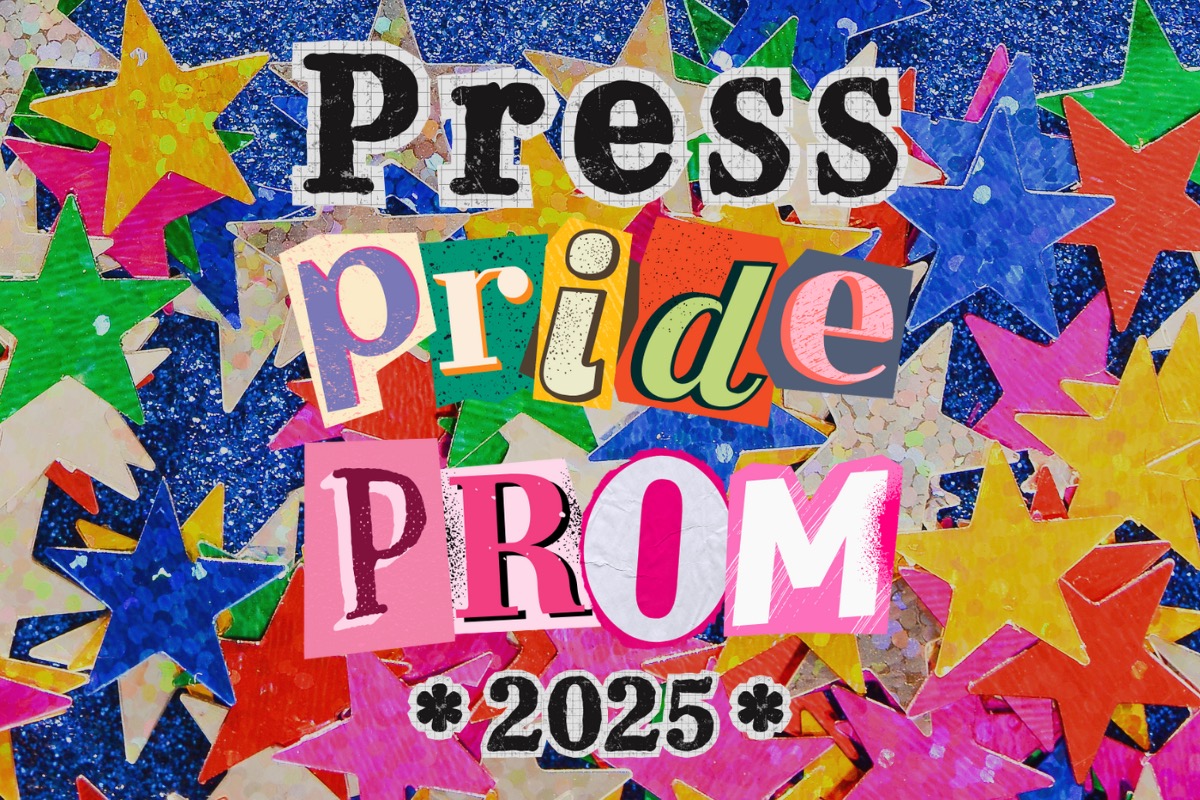
On July 26, 2025, at the Grand Central Air Terminal, the Los Angeles chapter of the NLGJA, the Association of LGBTQ+ Journalists, will host Press Pride Prom, a benefit and awards ceremony honoring Southern California journalists and newsrooms. Three inaugural journalism awards will honor those who championed LGBTQ+ stories in 2024.
The Los Angeles Blade, in collaboration with the NLGJA, will present the Troy Masters Legacy Award for Visionaries in Media, honoring a journalist or news media professional whose work reflects a dedication to the craft of journalism and a commitment to setting the stage for the next generation of LGBTQ+ industry leaders. Troy Masters was a veteran, queer journalist, and founding publisher of the Los Angeles Blade who passed away unexpectedly last year.
The inaugural nominees are nominees include Mariah Castañeda, co-founder of LA Public Press; veteran journalist LZ Granderson, who currently serves as an OpEd columnist for the Los Angeles Times and an ABC News contributor; and John Griffiths, founder of GALECA: The Society of LGBTQ Entertainment Critics and Dorian Awards.
The Los Angeles Blade is honored to be given this opportunity by the NLGJA to pay homage in such a profound way to Masters and the legacy he created, and that the Blade continues to cultivate, for the queer community.
NLGJA LA co-president Hansen Bursic shared, “We are honored to present an award this year in honor of beloved Los Angeles publisher and journalist Troy Masters. These nominees embody Masters’ dedication to LGBTQ+ journalism and his passion for community building in Southern California and beyond.”
The Los Angeles Blade is further honored to be listed as a nominee for the event’s Excellence in LGBTQ+ Reporting Newsroom Award, honoring a news outlet whose coverage of the queer and trans community is well-informed, complex, varied and intersectional, with a track record of promoting The Association of LGBTQ+ Journalists’ mission to advance fair and accurate coverage of LGBTQ+ communities and issues. We are nominated alongside LAist and Variety.
The evening will also include the presentation of the Queer Beat Award for Excellence in LGBTQ+ Reporting, honoring a single story or series that demonstrates care, skill, and a commitment to fair and accurate reporting of LGBTQ+ themes, issues, and people. The nominees include A Night They Can’t Remember, at One of the Country’s Most Popular LGBTQ+ Bars by Kate Sosin and Steven Blum for The 19th; Banned Rainbows and ‘Forced Outing.’ Will Elections Reshape This Relentless School Board? by Jaweed Kaleem for the Los Angeles Times; and She Was Supposed to Be at Pulse Nightclub — And Club Q. Now She’s Fighting To Keep LGBTQ+ People Safe by Lil Kalish for HuffPost.
NLGJA LA co-president Katie Karl remarked, “These nominees represent the diverse and passionate spirit of Southern California’s LGBTQ+ journalism community. At a time when queer and trans stories and journalists are under attack, we are proud to uplift a few of the incredibly talented journalists who are speaking truth to power and helping tell our community’s stories.”
The awards, presented by ABC7, will be hosted by veteran LA-based journalist and GLAAD award winner, Tracy Gilchrist. The ceremony will be held on July 26 from 6 to 9 p.m. in Glendale at the historic Grand Central Air Terminal. The evening will be prom-themed, giving attendees the opportunity to relive high school memories as their authentic selves.
Early bird tickets are on sale now until June 20. Tables and regular tickets will also be available
to purchase through July 18. You can learn more and get tickets here.
Arts & Entertainment
2025 Emmy nominations: ‘Hacks’ and ‘The Last of Us’ bring queer excellence to the table
‘Hacks’ and ‘The Last of Us’ are two of the most notable LGBTQ+ shows nominated at this year’s Primetime Emmys.

Earlier today, the 2025 Primetime Emmy nominations were announced, and a few of this year’s key frontrunners have particularly resonated with the LGBTQ+ community during a politically turbulent year.
Coming off Season 3’s win for outstanding comedy series, Hacks Season 4 was nominated for 14 awards, with Jean Smart, Hannah Einbinder, Julianne Nicholson, and Robby Hoffman being recognized for their performances. Since the show premiered in 2021, each season has explored the comedy and entertainment industry through the lens of generational differences between queer writer Ava (Einbinder) and the old-school Deborah (Smart).
While Smart has won outstanding lead actress in a comedy series for all three seasons, this year could be the chance for Einbinder, who identifies as bisexual, to finally take home a prize of her own in supporting actress. And if Season 4 nabs the outstanding comedy series crown yet again, it’ll be another huge moment for bisexual representation. But it will have to fend off the industry satire The Studio, which received a staggering 23 nominations for its breakout first season.
Another one of this year’s most high-profile contenders, The Last of Us, received 16 nominations for its second season, including non-binary actor Bella Ramsey, lead actor Pedro Pascal, and supporting/guest actors Kaitlyn Dever, Jeffrey Wright, Joe Pantoliano, and Catherine O’Hara.
Notably, though, Season 2 has been hit by much more backlash, much of which has been fueled by homophobic anger at the love story between Ellie (Ramsey) and Dina (Isabela Merced). Merced, who identifies as queer, was widely praised for her turn as Dina, but was not nominated for supporting actress. And while Season 1 received 24 nominations, Season 2 lost out on a few, bringing The Last of Us down a notch in its overall standing.
There were other snubs as well. Mid-Century Modern, the gay sitcom starring Nathan Lane, Matt Bomer, Nathan Lee Graham, and Linda Lavin, did not see any of its actors nominated. It also missed out on the Best Comedy Series category, for which it was considered a contender, although it did still receive four below-the-line nominations.
However, other openly queer actors were nominated, even for roles or shows not explicitly exploring queer issues or characters. Those include Colman Domingo for The Four Seasons, Cynthia Erivo for Poker Face, Michael Urie for Shrinking, Cooper Koch for Monsters: The Lyle & Erik Menendez Story, and Bowen Yang for Saturday Night Live.
Of course, it wouldn’t be the Emmys without RuPaul, who became the most-nominated reality host in Emmys history after landing his 10th nomination for RuPaul’s Drag Race. He’s also nominated alongside Alan Cumming of The Traitors fame. And in the Outstanding Documentary or Nonfiction special category, the critically acclaimed Will & Harper and Pee-wee as Himself were nominated, and are both considered strong contenders to win.
TV fans can find out which of their favorite queer actors or shows take home top prizes on Sunday, Sept. 14, with Nate Bargatze hosting the 77th annual awards at the Peacock Theater in Los Angeles.
Movies
‘Superman’ is here to to save us, despite MAGA backlash
Man of Steel was always a flashpoint for controversy
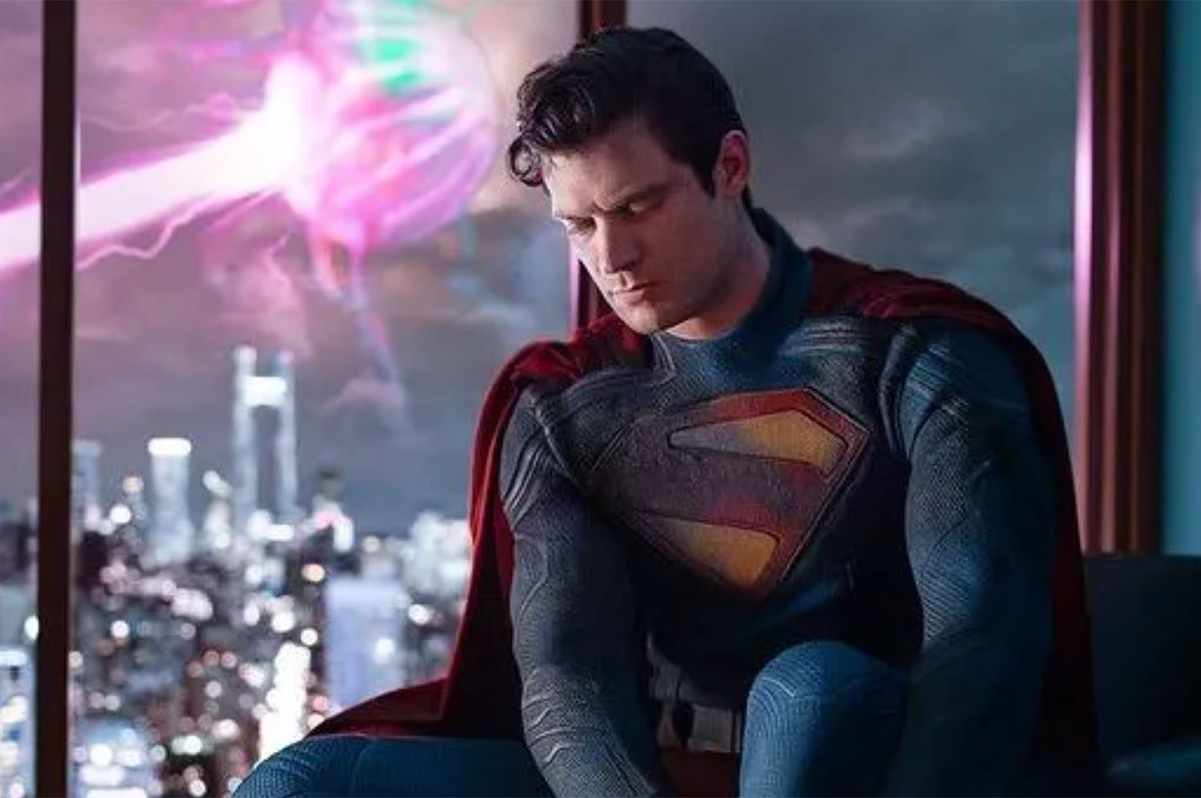
Anyone who argues that Superman should never be politicized clearly knows nothing about Superman.
The “Man of Steel” has been a flashpoint for controversy almost from the beginning, when he was created by writer Jerry Siegel and artist Joe Shuster – two Jewish Americans born of immigrant parents, who conceived the character in a world where the economic disparities of the Great Depression, the rise of global fascism, and the threat of impending war were looming large across American life. Theirs was a hero for the time, who used his strength to help the weak instead of to subjugate them, who stood up against the forces of greed, corruption, and insatiable power to prioritize human life above all other considerations. Is it any wonder that his values would become objectionable to conservatives when the moral complacency of postwar prosperity kicked in? In the hawkish American ideology that dominated the Cold War era, such notions became inconvenient.
To be fair, there has been liberal backlash against the character, too; Superman has often been framed as an icon of American “exceptionalism” that served as a jingoistic mask for the deeper ambitions of the capitalist elite. Indeed, the success of the 1978 “Superman: The Movie” (starring Christopher Reeve in arguably the most beloved big screen iteration of the character) largely hinged on its refutation of jaded disillusionment at a time when America had become too “hip” for wish-fulfillment fantasies about an invincible hero who could save the world.
Since then, of course, Superman has undergone further evolution, mirroring a cultural return to cynicism with a parallel transformation of Krypton’s last son – in the movies, at least – into a morally conflicted figure with deep doubts about his mission and crippling regrets over the collateral damage he’s caused in the pursuit of “truth, justice, and the American Way.” Fans were divided, and this new-and-darker version of “Supe” – despite the fan appeal of Henry Cavill, who donned the red cape for three films under director Zack Snyder – failed to generate the kind of enthusiasm that would elevate DC (and parent company Warner Brothers) to the popularity level of Marvel’s rival cinematic universe.
Now, with James Gunn’s “Superman” – the latest reboot of the comic book hero’s big screen franchise, which serves as the starting point for a new “DC Cinematic Universe” (DCU) after the last one was tanked by mediocre reviews and disappointing box office receipts – the tables have been turned once again. In Gunn’s “reset,” the character (played with infectious and unassuming charm by David Corenswet) is a true idealist, embracing a presumed role as protector of Earth without a sense of being burdened, and motivated to make a difference even through the journalistic efforts of alter-ego Clark Kent. For him, it’s simple: if innocent people are in danger, he is there to be their champion.
That said, he’s still something of a mess. In his imperative to protect mankind, he is at odds with the protocols of the human world order, which don’t always line up with his goals. In fact, when the story begins, Superman is already under fire from the media for his disregard of political procedure and international law, having unilaterally prevented a Central European dictator from invading a neighboring country only weeks before. This diplomatic faux pas has led billionaire tech genius and corporate giant Lex Luthor (Nicholas Hoult) to focus his vast resources on a public smear campaign against him.
Needless to say, Luthor has his own secret agenda, a push for global power that depends on ensuring that Superman is eliminated from the equation. Fortunately for the caped Kryptonian, he has the help of Clark Kent’s Daily Planet associates – girlfriend Lois Lane (a perfectly cast Rachel Brosnahan, best known as “The Marvelous Mrs. Maisel”) and Jimmy Olsen (Skyler Gisondo, “The Righteous Gemstones”) – and an assortment of fellow “meta humans” (i.e. superheroes) to keep him on track.
We won’t spoil the outcome, though it’s a safe bet that the good guys will triumph in the end. More important is that Gunn’s ambitious reconfiguration of the classic mythos makes the choice to go all-in on the qualities that once made Superman the epitome of an archetype.
Corenswet brings an everyman likability to his larger-than-life character, within which all his nods to ethical purity feel like a triumph instead of a capitulation to comfortable sentiment. He inhabits the role, even in the guise of Clark Kent (who, as we are reminded by recall to a long-forgotten canonical flourish, gets away with his disguise via “hypno-glasses” which mask his obvious resemblance to Superman in the eyes of all who see him), and taps into something that transcends the formulaic conventions of the superhero genre. While he may not bring the effortless charm that Reeve carried into the role, he delivers something equally engaging – a real sense of trying to do better – which makes it possible for us, as viewers, to identify with him. Brosnahan’s Lane is revelatory, a modern incarnation that emphasizes her integrity as a journalist to make her an equal to her superhuman paramour; their chemistry, highlighted through a classic “screwball comedy” dynamic in their banter and informed by the active role she plays in the heroics that drive the film, is not only refreshingly equitable but honest.
As for Hoult’s palpably Musk-ish Luthor, he delivers all the smug arrogance we need from a supervillain while also leaving room for a sliver of compassion. In smaller roles, Gisondo’s Olsen is a presence to be taken much more seriously than many of its earlier iterations, while an over-the-top turn from Nathan Fillion as a bro-ishly tacky Green Lantern and the underplayed solidity of Edi Gathegi’s no-nonsense Mr. Fantastic effectively contrast Corenswet’s optimistic Kal-El.
Yes, it’s a little too “busy,” and it admittedly suffers from the contemporary genre’s rapid-fire flow of information, action, and peripheral characters. There’s also the gratuitously irresistible presence of Krypto, a “superdog” under the temporary care of our hero. Even so, these elements somehow give Gunn’s movie a heartwarmingly goofy quality. It’s just that kind of film.
Which brings us to the question of why anyone could see it as anything but a validation of what makes this character so uniquely American. Taken without contemporary real-world context, it’s hard to object to Gunn’s new vision of Superman unless one has a fundamental problem with the idea that compassion, kindness, and equity are goals worth fighting for.
In the context of Trump’s America, however, the movie’s insistence on highlighting these values, along with its emphasis on Superman’s status as an “alien” immigrant and a general sense of inclusiveness among its ensemble cast, feels like a radical notion.
That says more about “them” than it does about “us,” frankly, and for our part we’re grateful for a movie that not only breaks the “superhero fatigue” that has developed for moviegoers over the last few oversaturated years, but dares to refute MAGA-driven talking points about “toxic empathy” and the equality of immigrants (after all, Superman has always been an alien) to reinforce a vision of America that feels worth fighting for.
Sports
Hololive and Dodgers create a home for queer fandom
More than just a baseball game, Hololive Night became a joyful convergence of fandom, self-expression, and community, drawing fans from across the globe.

On July 5, 2025, Dodger Stadium transformed into a vibrant cultural celebration as hololive production returned for its second Hololive Night in collaboration with the Los Angeles Dodgers. More than just a baseball game, the event became a joyful convergence of fandom, self-expression, and community, drawing fans from across the globe.
Over two hours before the first pitch, fans packed the dedicated hololive queue, eager to collect exclusive Dodgers x hololive trading cards featuring Ninomae Ina’nis, IRyS, and Koseki Bijou. Some fans braved the summer heat for hours, while others traveled from as far as Japan for the event. Dodger Stadium became a colorful showcase of anime-inspired fashion, VTuber cosplay, and unmistakable fan pride.
For Tama, a bisexual streamer, the connection to hololive is personal. “I don’t know if I qualify as a VTuber, but I have a little PNG,” she shared with a laugh. Fully decked out in Ina’nis gear—wig, plushie, and merch—Tama has been a dedicated fan since Ina’s debut in 2020. “It’s because she’s an artist and also because she’s really calm and funny. She streams on YouTube, so I kind of just connect with her a lot. She’s relatable, comforting, and inspiring.”
Tama was especially excited to attend her first-ever baseball game and see Motoaki Tanigo—known affectionately to fans as “Yagoo,” the CEO of COVER Corporation—throw the ceremonial first pitch. “He is the most involved CEO you’ve ever seen in a company,” she said.
Yagoo’s leadership has become part of hololive’s charm. Fans admire how visible and engaged he is, and the company’s approach to events like Hololive Night shows that the fan experience is a priority. This year’s collaboration marked a milestone as the first-ever VTuber livestream both to and from Dodger Stadium. Hololive talents not only cheered on the Dodgers but also led the crowd in a sing-along of “Take Me Out to the Ball Game” and hosted post-game activities on the field, including an interactive dance segment called “WHO’S got the MOVES?!?!”
Fans explored hololive-themed photo ops, enjoyed special stadium snacks in event-exclusive packaging, and had better access to merchandise this year thanks to improved in-stadium sales. Last year, many fans missed most of the game due to long lines at a single merch tent. This time, the experience felt smoother and more celebratory.
Owen, a bi-curious fan who is exploring his gender, shared why VTubers resonate so deeply with him. “I like a lot of feminine things—clothing, colors, jewelry, accessories—a lot of stuff that they don’t give male characters in games. You can’t be a feminine male character in games a lot. It’s really nice to get to just pick the female characters because it feels like me even more than the male characters.”
Owen has been a hololive fan since 2020 and attended last year’s Dodgers event as well. “I like being a fan of stuff. I like music, gaming, stuff like that.” He feels especially connected to Ina’nis through her music. “She has a collaboration with a producer I really like, Camellia. One of the things that drew me to her originally was from her debut stream. She mentioned being a fan of Camellia. That was cool to me because he’s a sort of niche producer and it was cool to see someone like Ina be into him.”
For many fans like Owen and Tama, VTubing isn’t just entertainment, it’s a safe space to explore identity and express emotions without judgment. “People can see it as a mask, but I almost view it as being able to be your true self because you don’t have to have your appearance be the first thing that people see,” one fan explained.
When I asked Yagoo why VTubing has become such a meaningful and emotionally safe space, he reflected that this was something he realized early on. “The ability to step away from physical labels—things like appearance, race, gender—and to let someone’s creativity stand on its own, whether as an artist or as a performer, is what makes VTubers such a powerful tool.”
He shared that hololive’s global community includes LGBT fans who find a deep connection through female characters. “In the initial stages of the business, the idea that it would be a great way for people to express their true selves—their preferences and identities—became clear pretty quickly.”
As hololive continues to grow, especially in the U.S. and cities like Los Angeles, Yagoo said the company is exploring new ways to reach broader audiences. “Originally, we started by focusing on anime fans and VTubers were quickly embraced by that community. Now, we are trying to create more opportunities through gaming and music as an entry point for people to engage with VTubers.”
The possibilities are exciting. Fans have already built vibrant, diverse communities, and there is potential for hololive to grow even further—through partnerships with Pride events, collaborations with queer creators, and deeper connections with LGBTQ+ fans who already see themselves reflected in this world.
As Ina’nis playfully joked during the event, “Just think: all of our fans outside their houses! In the real world! In Dodger Stadium! You did it! You went outside and touched grass!”
For many, Hololive Night was about more than the game. It was about showing up, being seen, and finding joy together, in real life, and across the virtual worlds we continue to build.
a&e features
The art of controlled chaos: Patrick Bristow brings the Puppets to life
As co-creator and host of Puppet Up! Uncensored, a wild, “adults-only” improv puppet show developed with Brian Henson of the Jim Henson Company, he combines razor-sharp comedy with next-level puppetry in a way that’s as unpredictable as it is funny.
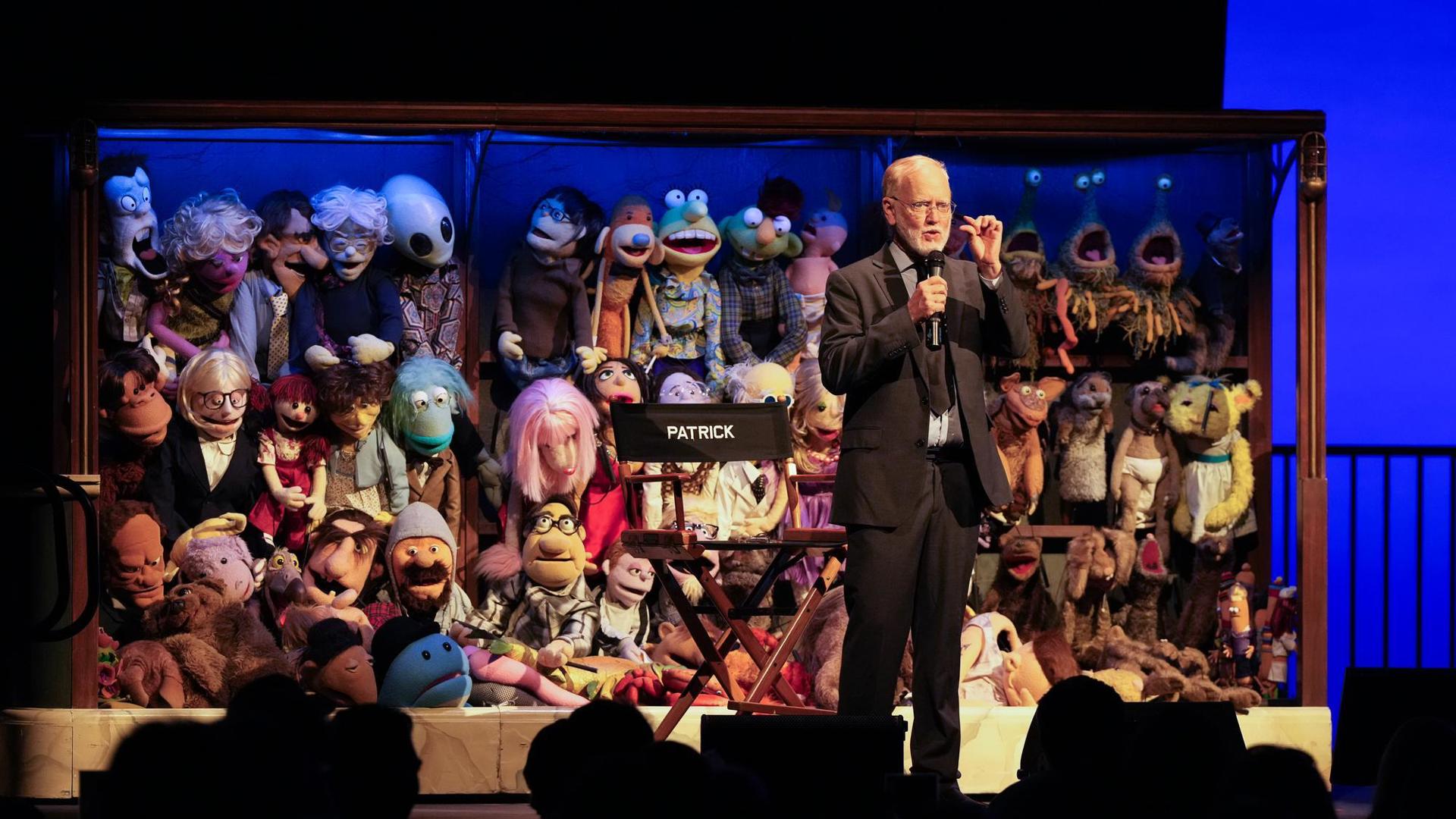
Whether he’s elbow-deep in puppets or stealing scenes on screen, Patrick Bristow knows how to keep things unapologetically unpredictable and rich with comedy. With decades of improv under his belt and a knack for the unexpected, he proves that comedy and puppetry are best when it’s uncensored.
For over three decades, actor, director, and improv vet Patrick Bristow has been a familiar face across television and film, from his memorable portrayal of Peter on the groundbreaking sitcom Ellen to scene-stealing appearances on Seinfeld, Curb Your Enthusiasm, and more. But Bristow’s creative energy doesn’t stop in front of the camera. As co-creator and host of Puppet Up! Uncensored, a wild, “adults-only” improv puppet show developed with Brian Henson of the Jim Henson Company, he combines razor-sharp comedy with next-level puppetry in a way that’s as unpredictable as it is funny. We chatted with Bristow from his home in Joshua Tree to talk about the show’s origins, the lasting lessons of improv, his unique take on fame, and the true essence of Nellydom.
For our readers who are not yet familiar with the excellence that is Patrick Bristow, could you introduce yourself?
Sure! I’m Patrick Bristow. For most of my 30-some odd years career, I’ve worked as an actor in TV and film, lots of small but memorable roles. But today, I’m here to talk about a show I co-created with Brian Henson of the Jim Henson Company called Puppet Up! Uncensored. It combines brilliant Henson puppeteering with improv comedy. I was in the main company at The Groundlings years ago and have been teaching improv ever since. So this show is a perfect blend of those worlds—kind of a chocolate and peanut butter situation. And we’ve been doing it, on and off, for nearly 20 years.
What’s it like collaborating with Brian Henson?
Brian is incredibly talented, legendary in his own right. Working with him is a dream. We’re both focused on creating the most fun experience possible, both for our audiences and our performers. When we disagree, we figure it out quickly or try both options and go with what works best. There’s no ego involved, just a shared goal.
How did Puppet Up! Uncensored come to life?
Originally, Brian brought me in to teach improv workshops for his puppeteers. He wanted them to gain some of the benefits of improv training—spontaneity, specificity, making bold, immediate choices. We had a group of high-level puppeteers—people whose work you’d definitely recognize, even if you don’t know their names. Some had improv experience already, some didn’t, but they were all great.
After the trial period, Brian asked, “Do you want to keep doing this?” And I said, “Absolutely.” It was really exciting for me to teach improv in a new way because puppeteering requires such a different approach. It wasn’t the same as teaching “fleshies,” as we call human performers in the puppet world.
“Fleshies”?
(Laughs…) Yeah, it sounds a little derogatory, and maybe it is, but I’m standing by it.
If you could create a puppet of any celebrity to add to the show, who would it be?
Oh, that changes weekly! But right now? A Pedro Pascal puppet. If the Henson team could make one as hot as the real Pedro, I’d be thrilled.
Puppet Up! is described as improv meets puppetry… but for adults. How do you balance the humor?
We definitely bring the snark and satire. We try not to get political, because we want a wide spectrum of audiences to enjoy the show. But yes, it can get spicy. And sometimes a little too spicy, at which point I’ll step in as the “schoolmarm” and redirect. The audience often gives us wild suggestions, and we run with it, within reason!
Let’s rewind for a moment back to the ‘90s. You were on Ellen, a show that was way ahead of its time. What was that experience like?
It was thrilling and, at times, scary. There was a bomb threat on set while we were filming the infamous “Puppy Episode” when Ellen came out. I wasn’t there that day, thankfully, but it was intense.
Later that season, when her coming out was being teased, I’d get recognized and even grabbed by strangers in public with questions. That visibility gave me a little taste of what fame feels like, and I realized it wasn’t for me. I liked being the guy who dodged in and out of scenes without the chaos that comes with full-blown celebrity.
So you’d take the work, not the fame?
Exactly. The 18-year-old me wanted to be a TV star. But the 30-something me, and now older, gray-haired me, is content making a living doing what I love. Fame sounds exhausting. I’ll take the bank accounts, though! (laughs)
Speaking of things you love: improv. What’s one thing from improv that people can apply to their everyday lives?
Listening without pre-planning. Really tuning in to what someone is saying, absorbing it emotionally and imaginatively, and then responding authentically. Improv teaches you to focus, to be present, and to let go of control, especially if, like me, you’re a hyperactive overthinker. It’s been a lifesaver for me.
Between performing, teaching, and directing, what role do you connect with most now?
Teaching. And hosting Puppet Up! Hands down. Both involve spontaneous interaction, deep listening, and applying everything I’ve learned. If teaching paid as well as TV work and came with insurance, I’d do it full time.
How have you seen representation in entertainment evolve over the years?
It’s come a long way. We’ve moved beyond the old stereotypes: the “straight-passing gay character” being a compliment to a much richer, more diverse portrayal of identities. I think of people like Titus Burgess, bold, bright, and unapologetically original. When I played Peter on Ellen, my husband said I was “striking a blow for Nellydom,” which I was proud of. That’s me! I’m into Jane Austen, I (try to) play the harp, and I once played Queen Elizabeth I at The Groundlings. If I repped for the Nells, I’m honored.
For readers unfamiliar with the term “Nellydom,” can you enlighten?
It’s the kingdom of femme expression, and unapologetically so. A little swish in your walk, pearls at dinner. Not in-your-face, just not hiding. There’s strength in that. The Nellys were at the frontlines of Stonewall. So yes, I’ll proudly reclaim Nellydom.
Puppet Up! Uncensored runs July 16 – 27th, 2025 at the Kirk Douglas Theatre: Tickets here
Television
ICYMI: ‘Overcompensating’ a surprisingly sweet queer treat
A sweet, savvy show about breaking free to embrace your true self

Pride month 2025 is now behind us, and while it’s safe to say that this year’s celebrations had a darker edge than usual, it’s also true that they came with a particularly rich bounty of new queer movies and shows to entertain us – so many, in fact, that even if we are facing a lull until the fall for another harvest of fresh content, there are still plenty of titles – which, for whatever reason, were off your radar – for you to catch up on in the meantime.
One of the most notable of these – the bingeworthy series “Overcompensating” (now streaming on Amazon Prime) – will most definitely have been on the radar for the plentiful fans of creator and star Benito Skinner, the actor/comedian who rose to viral fame through his content on platforms like Instagram, YouTube, and TikTok; for anyone else, it might have easily slipped through the cracks.
Created and written by Skinner as a loosely autobiographical collegiate comedy, it aims for the kind of raucous, explicitly sexed-up tone one expects from that genre as it centers on Benny (Skinner), newly arrived as a freshman at prestigious Yates University. A former football jock and “golden boy” at his midwestern high school, he’s the picture of idealized youthful masculinity; he’s also deep in the closet, struggling to keep his sexuality hidden and maintain his macho “bro” image under the intense scrutiny of the college’s social scene – and under the resentful eye of his older sister Grace (Mary Beth Barone), who has already secured her own place at the top of the pecking order.
In the first episode, Benny’s difficulties are eased when he meets Carmen (Wally Baram), another freshman trying to navigate the politics of college life; a gamer from a home disrupted by tragedy, she’s an outsider who feels like she’s putting on an act, too, and they click – giving him the convenient cover of female companionship while providing them both with much-needed support and encouragement. He’s also befriended by a handsome film major from England (Rish Shah), who has already caught his eye, stirring up other kinds of feelings faster than you can say “no homo.” Meanwhile, he’s being courted by the school’s “exclusive secret society” – headed by his sister’s aggressively “alpha” boyfriend Pete (Adam DiMarco) – and trying to stay interested in his studies, despite a growing realization that a career in business doesn’t actually appeal to him all that much.
That’s a lot to juggle for anybody, even an overachiever like Benny – whose “lucky” life so far has largely been the result of playing a role he is finding increasingly hard to maintain; but as the series goes on through its eight-episode arc, it becomes clear that he’s not the only one who is “keeping up appearances,” and he is just one of many confused and damaged young people in his orbit, all facing the painful (but often hilarious) process of evolution that is required in order to become truly oneself.
Tailored for appeal to a youthful demographic, “Overcompensating” is the kind of show that requires a few episodes worth of invested time to make an impression that feels like substance. Full of the bawdy farcical antics that go hand in hand with stories about hormonally charged college kids, it’s not above leaning into the formulas and tropes that have always driven these kinds of comedies. At first, while its broadly comedic strokes and frequently explicit sexual hijinks might elicit plenty of chuckles, the show might easily feel tiresome for more mature audiences; there’s a nostalgic fun to it, made even more appealing, somehow, by the “political incorrectness” of its frequently sexist and homophobic humor, but for a while things may feel like an unnecessary attempt to reinvent “Animal House” for the Gen Z crowd.
By the time the season reaches its halfway point, however, things have started to get real. The antics of these horny almost-adults take on a more pointed absurdity, informed by the increasingly tangled web of defensive deceit they weave among themselves – and, as things draw toward a cliffhanger climax, the consequences of maintaining it – until it achieves a sense of empathy toward them all. There’s a wisdom that smacks of lived authenticity underlying the whole affair, transforming it from the “sexploitative” teen comedy of its surface into something deeper. Sure, things stay expectedly wacky, and the soap-operatic melodrama of its twists and reversals continue to maintain the show’s “mature YA” appeal; but beneath those trappings, by the end of the season a truer identity has begun to emerge, just as its characters have begun to find their own levels of self-actualization for themselves.
As creator, primary writer, and star, it’s obviously Skinner who deserves much of the credit. While it might be tempting, early on, to dismiss the show as an “ego project,” the internet-spawned sensation proves his talents quickly enough to get past such judgy skepticism, delivering a pitch-perfect blend of sauciness and sensitivity that extends its appeal toward both ends of the taste spectrum; just as crucially, he brings the same aforementioned “lived authenticity” to his winning performance – after all, he’s essentially playing himself in a fictionalized version of his own life – while also making sure that equal time (and compassion) is afforded all the other characters around him, each of whom are pushing at the boundaries of their own respective “closets,” too. It’s unavoidable to notice that – like most of his co-stars – he’s plainly a decade too old to be playing a college student; but by the time we reach that crucial halfway turning point, we’ve become too engaged by him to care.
The show is full of excellent performances, in fact. Relative newcomers Baram and Barone offer layers of complex nuance, while the more familiar DiMarco (“White Lotus”) is close to heartbreaking as the toxic BMOC clinging to the illusion of power as his life begins to unravel around him. Other standouts include the mononymic Holmes as Carmen’s “wild girl” roommate, solidly likable turns as Benny’s parents from mature veterans Connie Britten and Kyle MacLachlan (whose presence, along with stylish elements in several key scenes, hints at an homage-ish nod to the late David Lynch), and podcaster Owen Thiele as an openly gay fellow student who has Benny “clocked” from the moment they meet. Finally, Lukas Gage makes a deep and tender impression as a former high school teammate at the heart of Benny’s most haunting memory.
There’s no official word yet on whether “Overcompensating” will be renewed for a second season, despite the multiple loose ends left dangling at the end of its first; it has proven to be popular, and Skinner’s large fanbase makes it likely that the story will continue. Even if it doesn’t, the place of uncertainty in which it has left its characters rings true enough to serve as a satisfying endpoint.
As for us, we hope that won’t happen. For all its sophomoric humor, generic plot twists, and purposefully gratuitous sexual titillation, it’s one of the sweetest, kindest, and most savvy shows we’ve seen about breaking free from conformity to embrace your true self – and that’s a message that applies whether you’re queer, straight, or anywhere in between.
a&e features
How this Texas drag king reclaimed their identity through Chicano-inspired drag

Three out of ten drag kings who were cast for this first season of King of Drag self-identified as Latinx and after episode two, only one Latinx king remains in the running for the competition.
Buck Wylde, a king from Dallas, Texas delivered a performance that took inspiration from their Catholic upbringing and Catholic school days to put together this persona. During the episode, they shared that they like to “play with religion.”
Murray Hill responded by adding, “sometimes we can’t afford to go to therapy for the Catholic guilt, so we do drag.” Buck Wylde says their therapy and their church is drag.
Buck Wylde, cancer sign, goes by Trigger Mortis when they are outside of drag and present more on the femme side. Along with Big D—another drag king on the series—they are the only two who are more femme outside of their drag persona.
During this episode, Buck Wylde also spoke about the difficulty of performing drag in a red state. They live in conservative Dallas, so they still struggle to find large-scale acceptance and support in the midst of statewide legislation targeting the LGBTQ community in Texas.
“Sometimes it doesn’t feel [as] safe as [I] would like it to be. There’s protesters all the time and we don’t have as many spaces to perform as kings there,” they said in the interview.
Buck Wylde says that for them, the most important thing about drag, is that it is and always has been a protest.
Living in a conservative state is a challenge to them as a drag king, but they say that it’s important for them to stand their ground and not only bring that representation to these areas, but also intentionally keep it there.
“So many people leave Texas for their safety and mental health to go to Portland, LA, or Colorado Springs or you know, anywhere but here.”
During the episode, Buck Wylde also opened up about how their religious background and cultural heritage added an extra layer to their identity issues growing up where they did. Their family wanted them to assimilate and even prevented them from speaking Spanish and they say that through Buck, they are able to re-examine what it means to be a part of that culture.
Buck Wylde is a third generation Mexican-American and they say that though their Spanish is not fluent, they say they do prefer their horchata without (ICE).
“I kind of straddled different worlds there, because I was sort of assimilated but I still had my Mexican culture. I always felt like I wasn’t connected enough because of the assimilation and it was through drag that I was able to reclaim my culture.”
In the first round of competitions for the second episode, the kings broke up into three teams of three for an improv skit where they would have to mansplain a topic and whichever team did it the best—won the group Weenie Challenge.
The winning team included Buck Wylde, Alexander the Great and Henlo Bullfrog. Together they improvised a skit where they mansplained the Amelia Earhart story.
For the solo show, they dressed up as ‘The Devil’ for the improv solo challenge, cracking a joke about how they are dressed like the person currently living in The White House.
Dressed as the Devil, sporting a Zoot Suit for the final competition, Buck Wylde improvised a skit with food.
Buck Wylde says they felt the pressure to perform because along with the other nine kings who were cast, they are the first ten kings to make it to the mainstream and represent king culture.
“We call ourselves the first ten because whatever happens, we’re responsible for how the kings are viewed and how we move forward together, being the blueprint for what’s to come,” said Buck Wylde in an exclusive interview with Los Angeles Blade.
Back stage before the solo improv competition, Buck Wylde says they felt their drag persona “crumbling” away.
They felt like Buck had abandoned them prior to their big moments to prove to the judges that they should stay in the running for the competition. They went up against Perka $exxx, who gave a king-based Dave Chappell performance.
In the end, it was Perka $exxx who received a 4-1 vote from the judges.
Buck Wylde left the show with some advice for the kings and the audience: “No matter what life throws at you, always remember who the Buck you are.”
King of Drag is now available to stream on RevryTV, an LGBTQ streaming platform for queer movies, TV shows, music and more — all for free. New King of Drag episodes will premiere weekly on Sundays.
Arts & Entertainment
Mary Lambert Returns With a Battle Cry in new single, “The Tempest”
It’s been nearly a decade since Lambert first broke through the mainstream
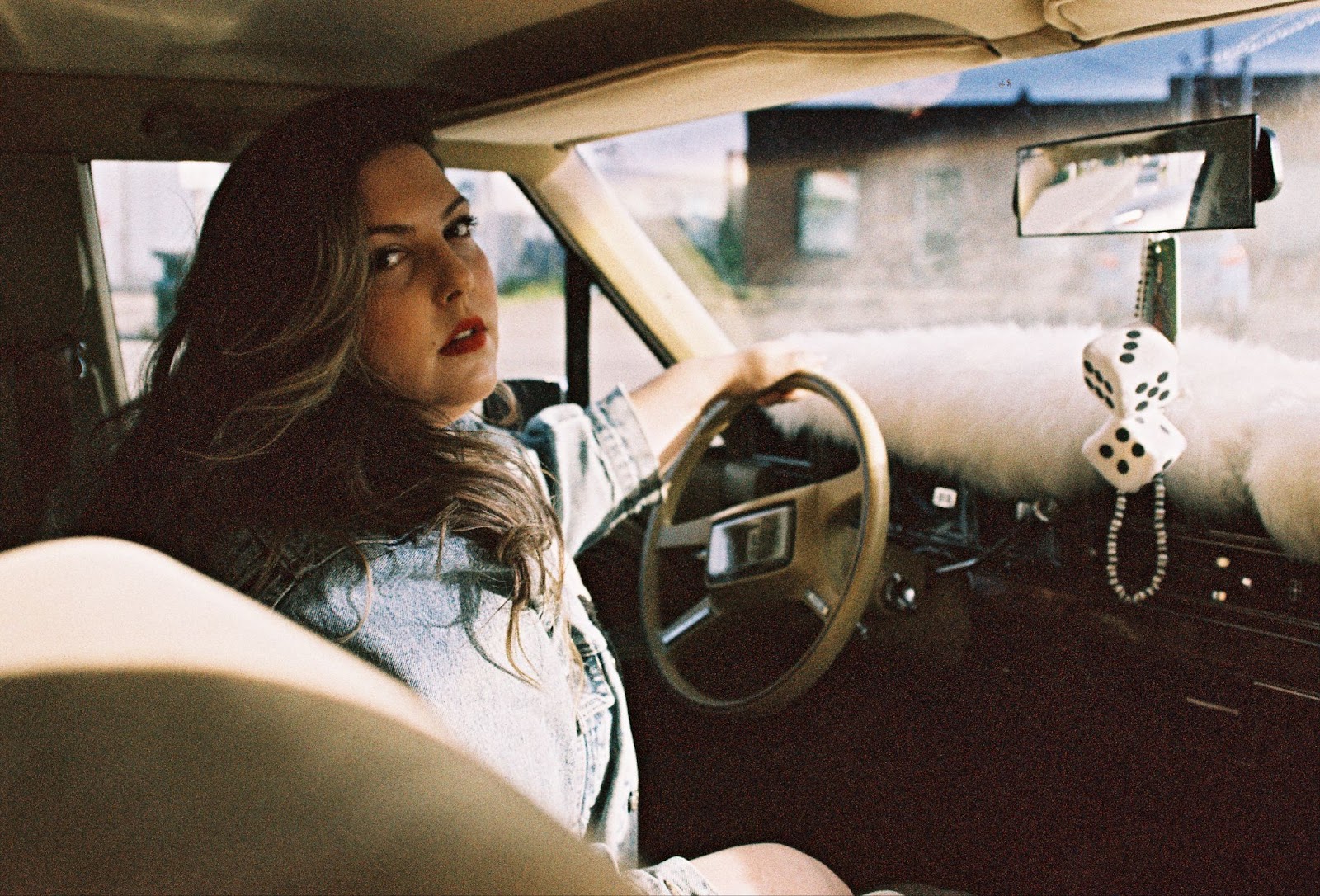
Mary Lambert has always worn her heart on her sleeve. From the vulnerable hooks on Macklemore & Ryan Lewis’ Same Love to her own deeply personal solo work, Lambert’s music has long been a home for tenderness, queerness, and healing. But with her new single, “The Tempest,” she’s stepping into something sharper. This isn’t just about healing. It’s about fighting.
“It’s incredibly empowering,” Lambert told the Blade in a recent interview. “I love writing sensitive sapphic ballads, but it’s been really exciting and personally cathartic to write a song that is so direct. For much of my life, I’ve been uncomfortable with anger, but as my desire for collective liberation deepens, I realize that anger is how love shows up on a hard day.”
Produced entirely by Lambert herself, “The Tempest” is a fierce, unapologetic anthem that channels righteous rage. The track is deeply personal, not just in its lyrics about bodily autonomy, abortion rights, and trans resilience, but in its very production. Lambert taught herself audio engineering during the pandemic after being turned down by multiple labels, producers, and writers.
“To be fully transparent, producing it myself was more of an economic choice out of necessity,” she said. “But ultimately, it resulted in a song that I have never been more proud of. The production might not be perfect, but from where I stand now, I feel that it’s perfect for the song.”
For Lambert, creative control is tied to the larger fight for autonomy in queer and marginalized communities. “When I was on a major label, self-producing music was out of the question, and I think that’s incredibly unfortunate because there are a lot of singer-songwriters like myself who do have an interesting sonic vision. As artists, we should be encouraged to be curious about it.”
Lambert explained that this song is deeply connected to the version of herself who needed it most. “I wanted to write a song that would have inspired my 18-year-old self. [“The Tempest”] is about hope and the belief that a revolution is not just possible, but imminent, and it’s up to us to rise to the occasion,” she said. “Ultimately, this song is about liberation. Shakespeare’s The Tempest ends with the tyrannical former duke, Prospero, learning lessons of mercy and forgiveness, but what if the people in positions of power in our world never learn those lessons? My version of The Tempest is one where we organize and demand more for our communities.”
It’s been nearly a decade since Lambert first broke through the mainstream, and in that time, her vision of queer liberation has evolved.
“‘Same Love’ was pretty clear about its messaging for marriage equality, but I think for many years, queer liberation has centered around the rights of cis gay people,” she reflected. “Sometimes I worry that actually translates to ‘hey, we can participate in the same hierarchical caste system too.’ We’re seeing the effect of what exclusionary politics look like in our community, with the rise of anti-trans legislation and figureheads like J.K. Rowling hijacking feminist movements.”
Lambert makes it clear that Pride can’t just be about rainbow parades when systemic harm continues. “What is Pride when ICE is stealing people from the street, when Gaza is bombed with impunity, when disabled people don’t have access to vital resources, when women in half of the country are forced to give birth if there’s an unwanted pregnancy? I just hope we are asking questions in our circles of ‘who is missing, why, and what are we doing about it?’”
And yet, amidst all this, Lambert insists joy and queer pleasure remain essential to the resistance. “The resistance needs us to be awake and alive, and that doesn’t happen through shame and suffering,” she said. “We have to find ways to connect. While many of us do have shared trauma, it should not be a prerequisite for connecting.”
When asked what community care looks like for her right now, Lambert points to something simple but revolutionary: vulnerability. “I started asking for help when I needed it,” she shared. “I read about interdependence, and it changed my life in a lot of ways. I find that my friends are far more comfortable asking me for favors now, and that’s what I think we need, people being truly vulnerable with one another.”
Looking forward, Lambert imagines a liberated future where queer and trans people have access to rest, good food, affordable housing, bodily autonomy, and vacations, where joy isn’t the exception but the expectation.“The Tempest” is available now on all streaming platforms. It marks the first single from Lambert’s upcoming third studio album, expected later this year.
Theater
Geffen Playhouse’s The Reservoir finds queer humor and joy in recovery and loss
Jake Brasch’s electrifying debut mines his own life for intergenerational drama
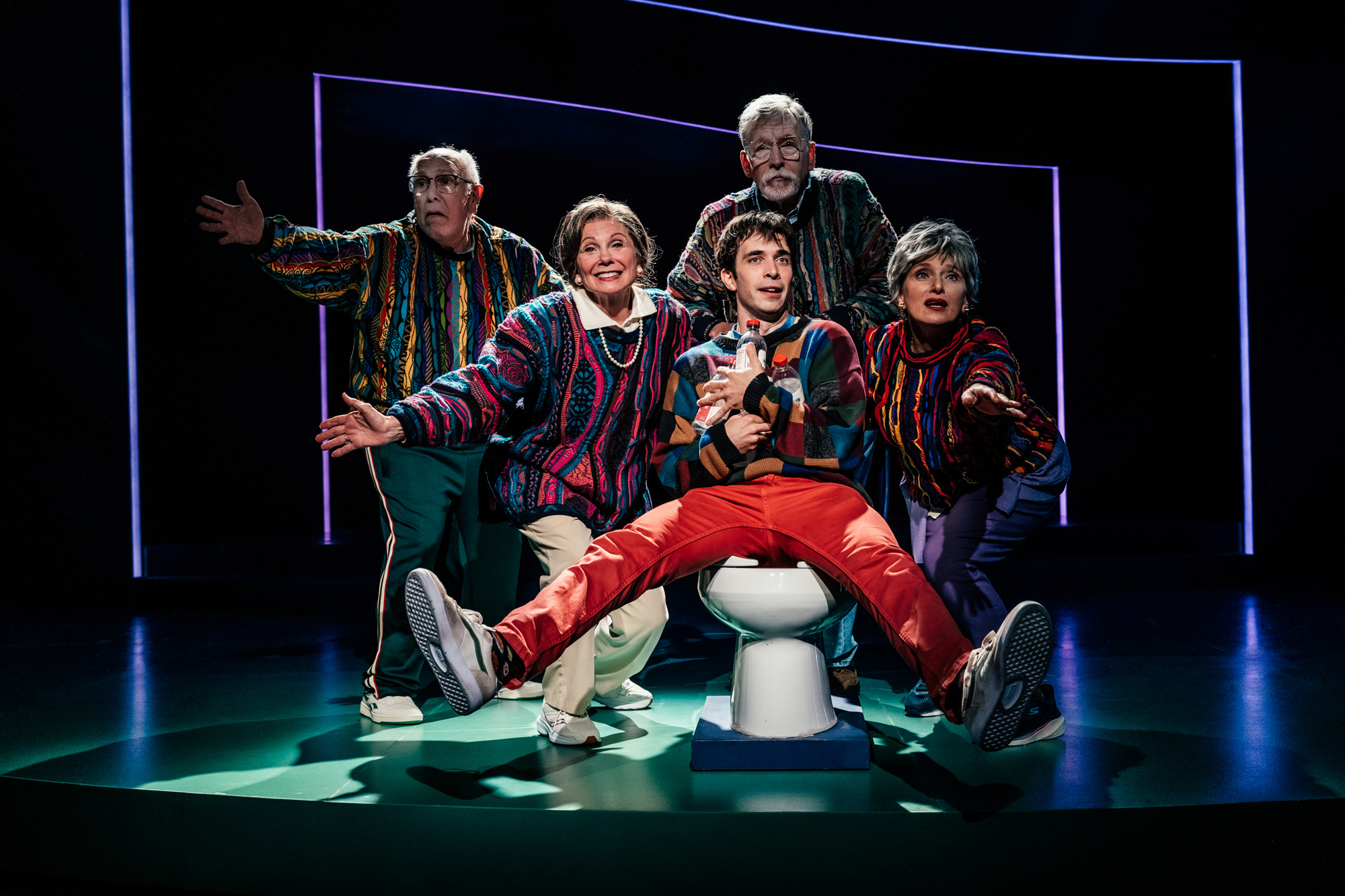
What do you get when you combine an alcoholic twink, a mother at the end of her patience, and a set of grandparents (nearing) the end of their wits?
In the Geffen Playhouse’s production of Jake Brasch’s new semi-autobiographical play The Reservoir, you get a stunning and hilarious drama about recovery and intergenerational connection.
As the play opens, we meet Brasch’s stand-in Josh (Jake Horowitz) in a deeply unflattering circumstance. He’s awoken in the park where he’s passed out drunk, having just returned home to Colorado after taking a medical leave from theatre school in New York due to his alcoholism. His mother, played by Emmy nominee Marin Hinkle (The Marvelous Mrs. Maisel), begrudgingly takes him in on the condition he stays clean and holds down the job she arranges for him at the local book co-op.
Josh then finds himself spending more and more time with all four of his grandparents, at first in an effort to find sympathy that’s in short supply at home, but then in a – sometimes misguided effort to halt their cognitive declines due to aging and Alzheimer’s disease. The project of helping his grandparents build their “cognitive reservoirs” through memory games, trivia, storytelling – and in one hilarious runner, preparation for a late-in-life bar mitzvah – helps distract Josh from his own disease for a time but exasperates his entire family.
Cognitive reserve is a real theory about how the brain can withstand and recover from trauma, betraying the play’s origin as a commission by the Sloan Foundation, which seeks to make connections between science and theatre. But in Brasch’s hands, the science of memory becomes exhilarating and real.
“I started from there, and I was just desperately looking for a pitch for [Sloan]. And then I kind of realized, oh shit, I’m writing about my grandparents, and the year that I moved home to get sober and reconnected with them and found an allegiance with them around the fact that we were foggy, we were all sort of in this space of not knowing, not remembering, and wanting to hold on,” Brasch says.
But while recovery and loss are weighty matters, Brasch, a recent Julliard graduate (spoiler, sorry) who’s making his professional playwrighting debut, finds lots of surprising laughs.
“That’s been a dance with this play,” he says. “This took me a while to learn but it’s about not letting the audience settle into one or the other. As soon as the drama feels like, ‘Oh my God, this is too much,’ we get a big joke. As soon as we feel like this is a sick comedy, we get absolutely knocked over. And I think that is my experience of what it feels like to be in crisis.”
That comedic touch helps deliver a key theme of the show, which is that recovery – both from addiction and loss – is actually a joyous process.
“Oftentimes people think that getting sober is going to mean that their humor and joy and partying is taken away from you. In my experience, it has been quite the opposite and learning to laugh at what’s hard in life has been my saving grace,” Brasch says.
“And specifically with Alzheimer’s, the things that one can do to protect themselves against this disease that we know so little about are just the things that one can do to leave a happy life, right?”
Brasch also finds a fresh angle on the strife between a young gay man and his family by focusing the story on the relationship between Josh and his grandparents. The play provides meaty roles for all four elders, including Carolyn Mignini and Geoffrey Wade as the Christian grandparents who are loving but still uncomfortable about their grandson’s queerness, Lee Wilkoff as the fun-loving grandfather who sometimes overshares in his efforts to preserve his fading memory, and Liz Larsen as the sage who deals in tough love.
“In trying to write something that’s intergenerational… this is sort of my attempt to try to bring a new audience into the theater at the same time that I created a play in which the existing audience feel seen,” Brasch says.
Placing older characters at the heart of the show also helps more conservative audience members swallow the show’s queer themes and storytelling elements.
“I think they’ve overlooked a lot of things that they might not. Otherwise, the play has a lot of profanity in it. It doesn’t follow naturalistic play rules. It’s extremely shaggy and weird and is not staged conventionally and folks have gone with it,” he says.
Centering elders isn’t just a strategy to flatter the subscriber base, though. Brasch is effusive in describing how his genuine connections with his grandparents has enriched his life.
Call your grandma if she’s still around,” he says. “Make those intergenerational connections because I am so grateful that late in the game, I made them and was able to glean so much wisdom and have fun. And God knows, we need intergenerational mutual understanding in today’s day and age.”
The Reservoir plays at the Geffen Playhouse, 10886 Le Conte Avenue
Los Angeles, CA, 90012, through July 20. Tickets at www.geffenplayhouse.org/
a&e features
From Drag Race to Dvořák: Thorgy Thor takes the Hollywood Bowl for Classical Pride
This Thursday, the Hollywood Bowl will host the nation’s first Classical Pride, spotlighting LGBTQ+ artists of today and those who have made lasting impacts across centuries of music.
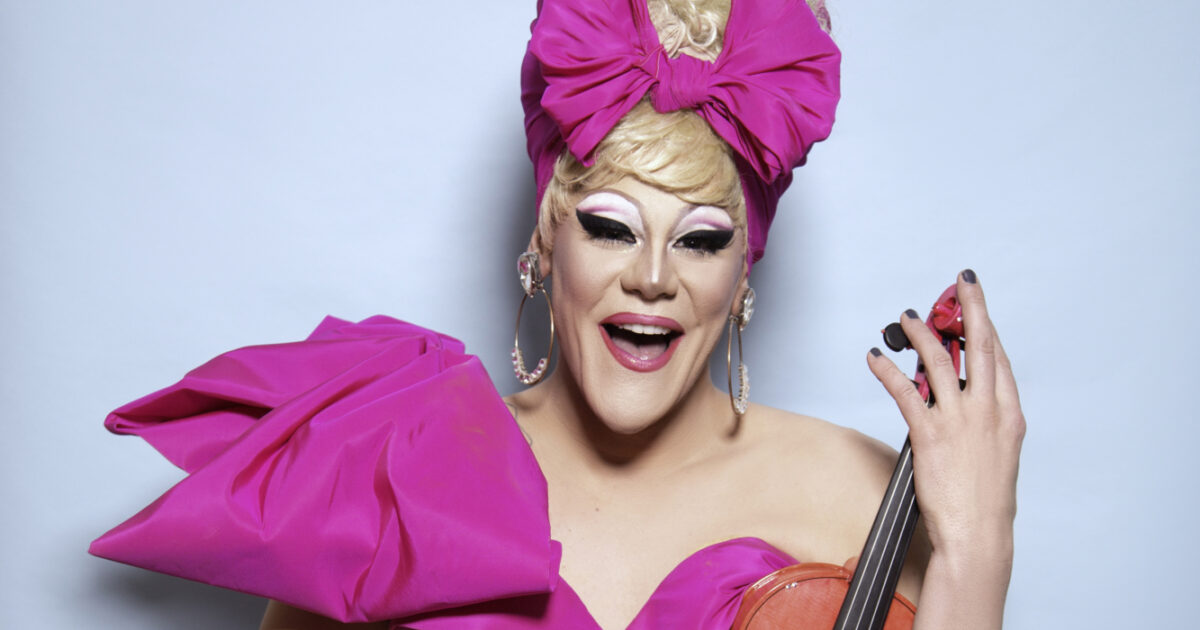
Thorgy Thor is reimagining what a symphony concert can be – queerer, louder, and way more fabulous. Classical music has always been a little gay; Thor is just making it official.
This July 10th, the Hollywood Bowl will be shaking things up with something a lot more fabulous than their usual line-up: Classical Pride, a star-studded celebration of queer excellence in classical music. Conducted by Oliver Zeffman, the program fuses Bernstein and Tchaikovsky with the glittering premiere of Pride Songs, reminding audiences that even the most straight-laced and serious-faced composers had secrets, some of which wore capes and wrote love letters to their (clears throat) roommates.
Enter Thorgy Thor, violinist, drag icon, and reigning monarch of orchestral mischief. Known from RuPaul’s Drag Race and her genre-busting “Thorchestra” shows, Thor is not only crashing the classical music party but redecorating it as she does. Armed with a Juilliard-level command of the violin and a wardrobe that would make Marie Antoinette feel modest, Thor’s been turning symphony stages into something that looks a lot like Studio 54 with better acoustics.
Ahead of her Hollywood Bowl debut, our publisher Alexander Rodriguez caught up with Thor to talk about shattering stereotypes, confusing classical purists, and why drag queens might just be the saviors of a dwindling symphony scene. Spoiler: there will be feathers, fan clacks, and at least one moment of unexpected depth. Because when Thor shows up with a violin and a vengeance, everyone listens, whether they planned to or not.
Some people associate Pride with dance and club music—but not classical. Why do you think that is, and why is it important to change that?
There’s a lot to unpack there. First off, I’m one of those people who definitely associates Pride with music – club music, dancing, parades, rainbow colors, joy. But not many people think of classical music in that context. I’ve been a classical player my whole life, and I’ve also marched in Pride parades. I celebrate both.
The truth is, a lot of people just don’t have access to the history of queerness in classical music. But it’s there. Some of the most prolific composers and conductors – Copland, Tchaikovsky, Bernstein – were gay. Back in the day, let’s be honest, probably everyone was a little bit queer. And since they’re not here to argue it, we get to speculate.
Classical Pride shows are important because they start to bridge that gap. It’s about giving people – especially younger folks – access to stories and voices that have always been part of this tradition but were hidden or unspoken.
How did growing into your identity affect your relationship with music and performance?
I was always immersed in music. My parents supported me with lessons, and I played in orchestras all through school – concertmaster, regional competitions, all that. I was always in the front. But something felt incomplete.
Coming into my queerness, I realized sitting quietly in an orchestra just wasn’t enough. My mind always imagined more – characters, colors, lights, theatrics. I’d be playing Tchaikovsky and thinking, “What if there was a drag artist miming with fans right now?” I needed more than just the music; I needed performance, spectacle, fun.
So I started pushing the dress code. I once showed up in a tux with the pants cut into shorts and bright magenta socks – and the orchestra was not into it. I’d say, “Why do men have to wear stiff bow ties when women get to wear flowy chiffon?” I wanted to challenge tradition, even if it meant getting in trouble. And I often did. But I realized that standing out was inevitable – so I decided to embrace it.
Now, funny enough, Thom Browne and Tom Ford are putting out tuxedos with shorts and high socks. I was just ahead of the trend. You’re welcome.
Why do you think celebrating classical music is important to the queer community right now?
Honestly, orchestras are struggling. Some are shutting down. Audiences are aging. There’s a perception that classical music is stuffy or boring, but it’s not. It’s powerful. It’s emotional. It moves people.
When I perform my “4G” show with symphonies, I always have to win over the orchestra first – they’re incredibly disciplined and talented, but also very skeptical. They’re like, “We just played with Hilary Hahn and Renée Fleming… now who’s this?” But then the show starts, and they see how serious I am about the music and the drag. And afterward, they often say, “That was the most fun I’ve had in 15 years.”
I ask the audience, “Who’s here because of RuPaul’s Drag Race?” Half cheer. Then I ask, “Who’s here because they have season tickets and don’t know who I am?” The other half cheers. That’s the goal: to bring these two very different groups together, laughing and feeling something powerful – together.
What’s your approach to blending these two audiences, drag fans and classical music fans, in one space?
I break the fourth wall. I talk to the audience. I do the first-ever live symphonic walk-off competitions – with Beyoncé, Lady Gaga, feather boas, and fans. I ask, “Who’s 65 and wants to werk?” I get kids up there. I give people drag names. It’s fun, inclusive, and unexpected.
A lot of classical audiences aren’t used to being asked to breathe, let alone unwrap a lozenge. So I set the tone from the top: “Relax, this isn’t that kind of concert.” It creates a space where different generations and communities can laugh together. That’s what I’m proudest of.
Has the current political climate affected your work?
Definitely. Just last month, I was scheduled to perform with the International Pride Orchestra at the Kennedy Center. Then, suddenly, we got dropped – after our president publicly tweeted that he didn’t want any “gay shows” at the Kennedy Center. He threatened to fine them something like $400,000.
Now, he doesn’t run the Kennedy Center, but the pressure worked. They canceled us. It was heartbreaking. Did I respect the decision? Not really. But I understood – they had a whole season to think about. Still, it hurt.
The good news? We moved the show to the Strathmore Theater, and it was incredible. Sold out. The audience showed up, loud and proud. The press was global – Germany, Italy, everywhere. That was beautiful and sad at the same time. That this is what’s making international news. But the show was triumphant.
Tell us about your new show, “Music and Fashion.”
It’s a wild ride – from Bach to Beyoncé. It’s funny, visual, historical, and super interactive. I do about 15 costume changes, some on stage, some on video. We start with a caveperson banging sticks and move through every decade – 1920s, Beatles, Taylor Swift, you name it.
It’s about moments where music and fashion collided and changed everything. From Marie Antoinette to Madonna, and how that relationship evolved. It’s smart, it’s campy, and I’m incredibly proud of it.
What can we expect from your appearance at the Hollywood Bowl’s Classical Pride show?
I’m one part of a bigger lineup that includes Anthony Roth Costanzo, Jamie Barton, Pumeza Matshikiza – some amazing talent. I’ll be performing a cheeky and sexy tango on violin by Jacob Gade, with a little twist in the middle.
I’ll also be doing a live on-stage interview with conductor Oliver Zeffman. Usually conductors show up, wave the baton, and vanish. But I want people to know who’s up there. I warned Oliver I’ll be asking him some left-field questions—and I’m not telling him what they are. It’s going to be fun, a little uncomfortable, and very entertaining.
What does the future look like for queer artists in the arts under this administration?
I’m going to keep doing what I do – being visible, being joyful, and doing it all with color, humor, and discipline. Just existing in this space is an act of rebellion. I don’t need to be political in every show. The work speaks for itself.
Queerness has always been in classical music. I think hundreds of years ago, people were more open than they are now. Today, it’s wild how threatened people get by others simply being happy. I don’t know what’s coming in the next ten years, but I’ll be here, still playing, still dressing up, still making people laugh.
What’s your message to the community this Pride season?
Dare to be different. I get kids coming up to me saying they never thought they could love classical music and be queer at the same time. But they can. You can love two seemingly unrelated things – and do them both fully.
Usually the people who are “too weird” or “too different” are the ones who change the world. And eventually, everyone copies them anyway.
Catch Classical Pride at The Hollywood Bowl Thursday, July 10th at 8 pm. Tickets here.
-

 News2 days ago
News2 days agoWest Hollywood to advance protections for diverse and non-nuclear families
-

 Commentary4 days ago
Commentary4 days agoThe Supreme Court’s ‘Don’t Read Gay’ ruling
-
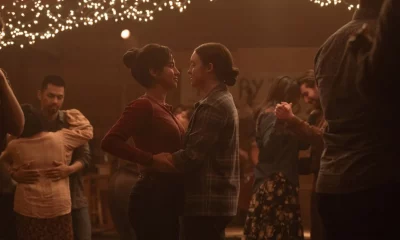
 Arts & Entertainment3 days ago
Arts & Entertainment3 days ago2025 Emmy nominations: ‘Hacks’ and ‘The Last of Us’ bring queer excellence to the table
-

 a&e features4 days ago
a&e features4 days agoThe art of controlled chaos: Patrick Bristow brings the Puppets to life
-

 Movies3 days ago
Movies3 days ago‘Superman’ is here to to save us, despite MAGA backlash
-

 Sports3 days ago
Sports3 days agoHololive and Dodgers create a home for queer fandom
-

 Events2 days ago
Events2 days agoLos Angeles Blade to take special part in NLGJA Los Angeles inaugural journalism awards
-

 Features52 seconds ago
Features52 seconds agoTS Madison Starter House offers a blueprint for Black, trans liberation




